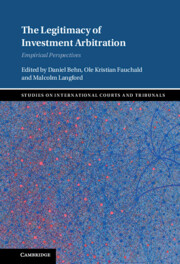Book contents
- The Legitimacy of Investment Arbitration
- Studies on International Courts and Tribunals
- The Legitimacy of Investment Arbitration
- Copyright page
- Contents
- Figures
- Tables
- Contributors
- 1 Introduction: The Legitimacy Crisis and the Empirical Turn
- 2 The International Investment Regime and Its Discontents
- Part I Process Legitimacy
- Part II Process Legitimacy
- 7 Foreign Investors, Domestic Courts and Investment Treaty Arbitration
- 8 Ensuring Correctness or Promoting Consistency? Tracking Policy Priorities in Investment Arbitration through Large-Scale Citation Analysis
- 9 Fair and Equitable Treatment: Ordering Chaos through Precedent?
- Part III Output Legitimacy
- Part IV Legitimation Strategies
- Index
9 - Fair and Equitable Treatment: Ordering Chaos through Precedent?
from Part II - Process Legitimacy
Published online by Cambridge University Press: 06 January 2022
- The Legitimacy of Investment Arbitration
- Studies on International Courts and Tribunals
- The Legitimacy of Investment Arbitration
- Copyright page
- Contents
- Figures
- Tables
- Contributors
- 1 Introduction: The Legitimacy Crisis and the Empirical Turn
- 2 The International Investment Regime and Its Discontents
- Part I Process Legitimacy
- Part II Process Legitimacy
- 7 Foreign Investors, Domestic Courts and Investment Treaty Arbitration
- 8 Ensuring Correctness or Promoting Consistency? Tracking Policy Priorities in Investment Arbitration through Large-Scale Citation Analysis
- 9 Fair and Equitable Treatment: Ordering Chaos through Precedent?
- Part III Output Legitimacy
- Part IV Legitimation Strategies
- Index
Summary
The growing judicialization of ISDS through the use of precedent may be contributing to improved consistency in the interpretation of the FET standard. The FET standard and its interpretation by arbitral tribunals has been blamed for giving foreign investors carte blanche to sanction governments over broad swathes of policy. It is said to be lacking any common definition and that it is a vague and ambiguous catch-all term. This chapter provides a rigorous qualitative and quantitative empirical assessment of the use of citations and their role in the development of the FET standard consistently by tribunals across time. Based on the in-depth exploration of FET case law the authors find that three landmark cases have a de facto stare decisis with the effect of reconciling competing interpretations and ultimately providing a relatively consistent standard.
Keywords
- Type
- Chapter
- Information
- The Legitimacy of Investment ArbitrationEmpirical Perspectives, pp. 256 - 280Publisher: Cambridge University PressPrint publication year: 2022

